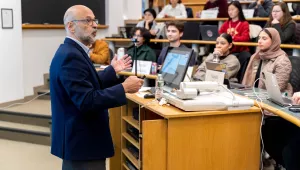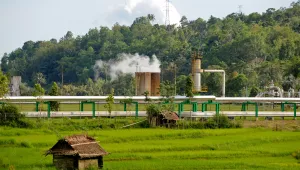The New Harvest Offers a Blueprint
Abstract
This policy brief is based on The New Harvest: Agricultural Innovation in Africa by Calestous Juma.
TOP LINES
- Africa can feed itself in a generation. Its agriculture has suffered a century of neglect, but a new crop of leaders focused on economic growth is poised to turn it around.
- The prospects are within reach. Africa has access to a large pool of technologies that can be harvested to raise productivity, reduce post-harvest losses, and improve markets.
- Africa must invest in rural infrastructure, expand higher technical training, and foster regional markets. It can learn from its own achievements like those of Rwanda and Malawi, and others such as China, Brazil, and India.
- This study identifies three major opportunities that can transform Africa's agriculture into a force for economic growth: advances in science and technology; the creation of regional markets; and the emergence of a new crop of entrepreneurial leaders dedicated to the continent's economic improvement.
African agriculture is at a crossroads. Persistent food shortages are now being compounded by new threats arising from climate change. But Africa also has three major opportunities that can help transform its agriculture to be a force for economic growth. First, advances in science, technology, and engineering worldwide offer Africa new tools needed to promote sustainable agriculture. Second, efforts to create regional markets will provide new incentives for agricultural production and trade. Third, a new generation of African leaders is helping the continent focus on long-term economic transformation.
The New Harvest provides policy-relevant information on how to align science, technology, and engineering missions with regional agricultural development goals. The book argues that sustaining African economic prosperity will require significant efforts to modernize the continent's economy through the application of science and technology in agriculture. In other words, agriculture needs to be viewed as a knowledge-based entrepreneurial activity.
The argument is based on the premise that smart investments in agriculture will have multiplier effects in many sectors of the economy and help spread prosperity. More specifically, the study focuses on the importance of boosting support for agricultural research as part of a larger agenda to promote innovation, invest in enabling infrastructure, build human capacity, stimulate entrepreneurship, and improve the governance of innovation.
REGIONAL COOPERATION
The emergence of Africa's Regional Economic Communities (RECs) provides a unique opportunity to promote innovation in African agriculture in a more systematic and coordinated way. The launching of the East African Common Market in July 2010 represented a significant milestone in the steady process of deepening Africa's economic integration. It is a trend that complements similar efforts in other parts of Africa. It also underscores the determination among African leaders to expand prospects for prosperity by creating space for economic growth and technological innovation.
One of the challenges facing Africa's RECs has been their perceived overlap and duplication of effort. Part of this concern has been overstated. The RECs evolved based on local priorities. For example, the Economic Community of West African States (ECOWAS) is by far the most advanced in peace-keeping while the Common Market for Eastern and Southern Africa (COMESA) has made significant strides in trade matters. In the meantime, the East African Community (EAC)—one of the oldest regional integration bodies in the world—has made significant advances on the social, cultural, and political fronts. It has judicial and legislative organs and aspires to create a federated state with a single president in the future.
This book builds on the findings of the report Freedom to Innovate: Biotechnology in Africa's Development, prepared by the High Level African Panel on Modern Biotechnology of the African Union (AU) and the New Partnership for Africa's Development (NEPAD). The panel's main recommendations include the need for countries in central, eastern, western, northern, and southern Africa to work together at the regional level to scale up the development of biotechnology.
TECHNOLOGY INNOVATION
The New Harvest aims to provide ideas on how to position agriculture at the center of efforts to spur economic development in Africa. It outlines the policies and institutional changes needed to promote agricultural innovation in light of changing ecological, economic, and political circumstances in Africa.
Using case studies of success stories, the book explores the role of rapid technological innovation in fostering sustainability, with specific emphasis on sustainable agriculture. It provides illustrations from advances in information technology, biotechnology, and nanotechnology. It builds on recent advances in knowledge on the origin and evolution of technological newharvestsystems. Agricultural productivity, entrepreneurship, and value addition foster productivity in rural-based economies. In many poor countries, however, farmers, small and medium-sized enterprises, and research centers do not interact in ways that accelerate the move beyond low value-added subsistence sustainable agriculture.
Strengthening rural innovation systems, developing effective clusters that can add value to unprocessed raw materials, and promoting value chains across such diverse sectors as horticulture, food processing and packaging, food storage and transportation, food safety, distribution systems, and exports are all central to moving beyond subsistence sustainable agriculture, generating growth, and moving toward prosperity.
Developed and emerging economies can do much more to identify and support policies and programs to assist Africa in taking a comprehensive approach to agricultural development to break out of poverty. This requires rethinking the agenda to create innovation systems to foster interactions among government, industry, academia, and civil society—all of which are critical actors.
FARMERS ARE THE KEY
The New Harvest is guided by the view that innovation is the engine of social and economic development in general and agriculture in particular. The current concerns over rising food prices have compounded worries about the state and future of African agriculture. This sector has historically lagged behind the rest of the world. Part of the problem lies in the low level of investment in Africa's agricultural research and development.
Enhancing African agricultural development will require specific efforts aimed at aligning science and technology strategies with agricultural development efforts. Furthermore, such efforts will need to be pursued as part of Africa's growing interest in regional economic integration through its Regional Economic Communities.
African leaders have in recent years been placing increasing emphasis on the role of science and innovation in economic transformation. The Eighth African Union Summit met in January 2007 and adopted decisions aimed at: encouraging more African youth to take up studies in science, technology, and engineering education; promoting and supporting research and innovation activities and the related human and institutional capacities; ensuring scrupulous application of scientific ethics; revitalizing African universities and other African institutions of higher education as well as scientific research institutions; promoting and enhancing regional as well as south-south and north-south cooperation in science and technology; increasing funding for national, regional, and continental programs for science and technology; and supporting the establishment of national and regional centers of excellence in science and technology. The decisions are part of a growing body of guidance on the role of science and innovation in Africa's economic transformation. These decisions underscore the growing importance that African leaders place on science and innovation for development.
However, the translation of these decisions into concrete action remains a key challenge for Africa. This study contends that one of the main problems facing African countries is aligning national and regional levels of governance with long-term technological considerations. This challenge is emerging at a time when African countries are seeking to deepen economic integration and expand domestic markets. These efforts are likely to affect the way agricultural policy is pursued in Africa.
SCIENCE AND PRODUCTIVITY
The 2007 African Union Summit decisions paid particular attention to the role of science, technology, and innovation in Africa's economic transformation, and they marked the start of identifying and building constituencies for fostering science, technology, and innovation in Africa. They focused on the need to undertake the policy reforms necessary to align the missions and operations of institutions of higher learning with economic development goals in general and the improvement of human welfare in particular. These decisions represent a clear expression of political will and interest in pursuing specific reforms that would help in making science, technology, and innovation relevant to development. However, the capacity to do so is limited by the lack of informed advice on international comparative experiences on the subject. The central focus of this book is to provide high-level decision makers in Africa with information on how to integrate science and technology into agricultural development discussions and strategies.
Africa is largely an agricultural economy, with the majority of the population deriving their income from farming. Food security, agricultural development, and economic growth are intertwined. Improving Africa's agricultural performance will require deliberate policy efforts to bring higher technical education, especially in universities, to the service of agriculture and the economy. It is important to focus on how to improve the productivity of agricultural workers, most of whom are women, through technological innovation.
KEY LINKS
Excerpts from The New Harvest
Recent Media Coverage
The contents of this policy brief may be reproduced, retransmitted, or translated for appropriate not-for-profit purposes. For questions or feedback, contact: Belfer Center for Science and International Affairs Communications Office at 617-495-5468.
Statements and views expressed in this policy brief are solely those of the author and do not imply endorsement by Harvard University, the Harvard Kennedy School, or the Belfer Center for Science and International Affairs.
Juma, Calestous. “Africa Can Feed Itself in a Generation.” Science, Technology, and Globalization Project, Belfer Center, January 2011





